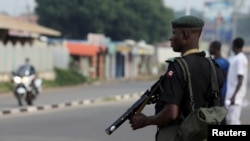At least 37 villagers were killed in Nigeria's north during an attack on a remote village on Sunday, according to witnesses.
The attack in the Kaura council area in the restive Kaduna state was blamed on a prolonged religious crisis between Hausa-Fulani residents, who mostly reside in the northern part of the state, and the Christians who are concentrated in the south.
Residents and health workers at the hospitals where corpses and the injured were taken told The Associated Press that assailants arrived at the Madamai village in large numbers with guns and machetes on Sunday evening.
A police spokesman in Kaduna said he has not been briefed about the incident in the area known as a violence hotspot. In August, five people were killed and some houses were burned down during a similar violence outbreak in Kaura.
On Sunday, "37 people were killed; 35 dead bodies (were) discovered in the village, two (died) in the hospital," said Derek Christopher, a local nurse at the General Hospital Kafanchan. He said the initial death toll was 30 as of Sunday night.
Those injured were given urgent medical attention before being referred to the Bingham University Teaching Hospital in Plateau state, which is about 115 kilometers (70 miles) away from the village.
At the hospital in Plateau, Sunday Eze said he narrowly escaped after being shot by the assailants.
"They shot me on my hand," he said, and, when asked how many the gunmen were, added ruefully: "They were plenty; these people."
Another resident who is overseeing care for those injured said that the attackers were Fulani herdsmen, referring to herders from the Fulani tribe who have been clashing with the predominantly Christian communities in southern Kaduna for many years.
"We have gunshots and we have machete cuts," said Cecilia Simon, a resident doctor. "In the hospital here, we are six (that arrived from the village). This thing is not our fault; maybe it is the fault of the government."
In Nigeria's middle belt and central regions, deadly clashes between local communities and Fulani herdsmen continue in a cycle of violence that has defied measures introduced by authorities including the deployment of thousands of security operatives to restore peace.
Security operatives deployed to violence hotspots usually leave those areas once their special security operation is over, leaving the remote communities yet again with an inadequate security presence.
Arrests are rarely carried out, and in Kaduna state, authorities have been accused of failing to act on the reports of government panels set up to investigate the crisis.





